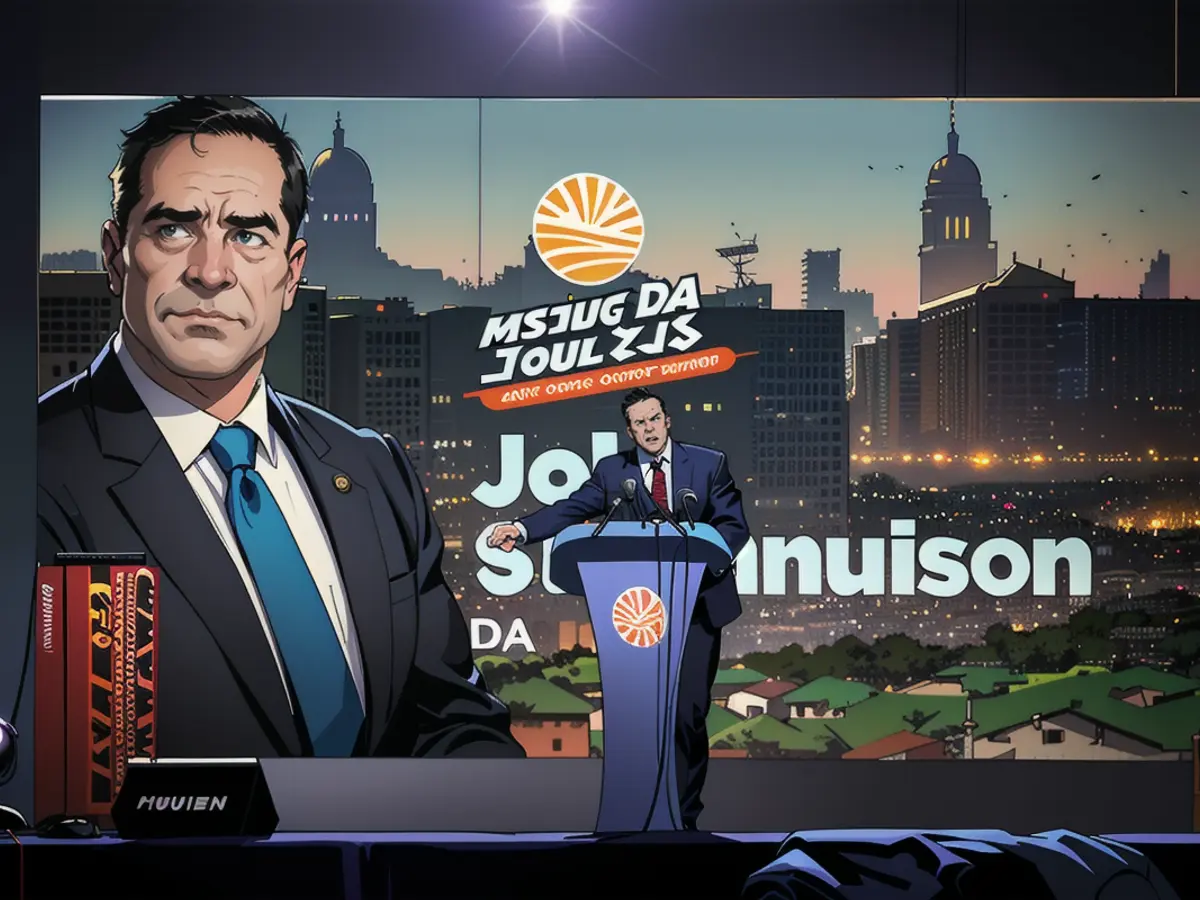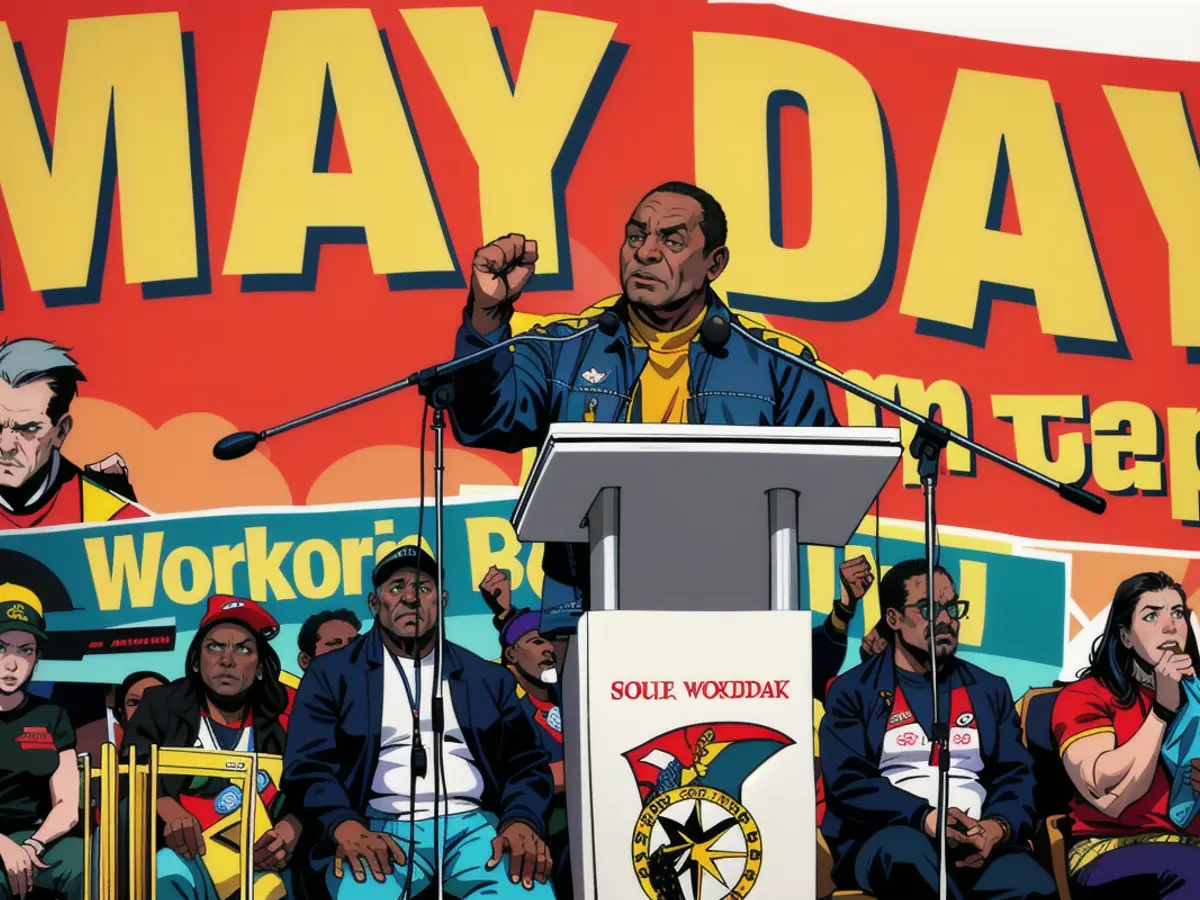For three decades, Nelson Mandela's political party has governed South Africa. It now encounters a crucial turning point.
Opinion polls suggest that the South African ruling party, African National Congress (ANC), could potentially lose its majority in the country's general election for the first time since Nelson Mandela led the party to power in 1994. Despite the challenges in polling in South Africa, most experts believe that the ANC is facing a significant challenge due to the dissatisfaction of the population regarding the country's future.
This is the seventh general election in South Africa since the end of white minority rule 30 years ago. Over 27.79 million people are registered to vote, which is the highest number so far, according to the Independent Electoral Commission (IEC). The party's dwindling popularity mirrors the struggles experienced by other liberation movements that have converted into governing parties across the continent.
Possible Outcomes
If the ANC's support level falls below 50% for the first time, it would be compelled to form a coalition government. Losing a simple majority would place immense pressure on President Cyril Ramaphosa within his own party, as he had promised a "new dawn" when he took over from disgraced former president Jacob Zuma in 2018.
Support for the ANC has been gradually declining for decades. The party received only 57.50% of the votes in the previous election in 2019.
What Went Wrong for the ANC?
South Africans have a long list of grievances. The country is experiencing an escalation in violent crime. Homicide rates have reached a 20-year high, with someone being murdered on average every 20 minutes, according to the most recent police crime statistics. Trust in the police has also eroded as part of a larger breakdown in trust in the government.
Overview of South African Elections
- South Africa employs a "proportional representation" system.
- Citizens cast their vote for a specific party instead of a presidential candidate.
- The electorate will have 31 political parties to select from in the national elections.
- The Independent Electoral Commission (IEC) facilitates the entire process.
South Africa has the highest sustained unemployment rate in the world, and the situation is worsening. The country is also grappling with electricity blackouts, water shortages, a crisis in education, and inadequate service delivery.
However, the most significant issue is the widespread allegations of corruption and mismanagement that continue to undermine the ANC.
When Ramaphosa, who Mandela favored to succeed him as leader, was appointed president in 2018 to replace the scandal-ridden Jacob Zuma, he promised, "I will work very hard not to disappoint the people of South Africa." But in 2022, Ramaphosa was forced to deny accusations of stealing funds.
"Corruption has wounded our democracy and shaken people's faith in our institutions," he acknowledged in a speech in November. "If corruption is not checked, the greatest damage won't be in the money stolen, the jobs lost, or the services not delivered. The greatest damage will be to our belief in democracy itself," Ramaphosa added.
2022 marked South Africa's lowest score in Transparency International's Corruption Perception Index. The scale ranges from 0 (highly corrupt) to 100 (very clean). South Africa received a score of 41, which is worse than China and Cuba at 42.
Other Notable Parties
The Democratic Alliance (DA), the main opposition party in the country, is headed by John Steenhuisen. The party, often seen as a party for White South Africans, has formed an alliance with smaller opposition parties known as the Multi-Party Charter for this election.
According to the polls, the ANC may have to choose between entering a coalition with the Zuma-backed party, the uMkhonto weSizwe Party (MK), and the Economic Freedom Fighters (EFF) or the DA.
Steenhuisen hasn't ruled out working together with the ANC if it manages to keep out the EFF and MK.
The EFF is a far-left, populist party led by former ANC youth leader Julius Malema. Initially, it was a breakaway faction of the ANC and advocates for land expropriation without compensation and broad state nationalism.
The EFF supports the MK party, and Malema recently declared that he might transfer his support to the ANC if it doesn't garner 50% of the votes. This, however, was contingent on his deputy, Floyd Shivambu, being appointed as the Minister of Finance. Steenhuisen has described such an ANC-EFF-MK alliance as a "doomsday coalition."
Zuma's Continued Presence
Former president Jacob Zuma continues to be a headache for Ramaphosa. Although he served a brief stint in jail in 2021 for contempt of court for defying a corruption inquiry, Zuma is now the MK party's leader. Until recently, Zuma was the top contender on the party's parliamentary list.
The Constitutional Court recently ruled on Monday that Zuma is not allowed to run for parliament until five years have elapsed since the completion of his sentence. The unanimous decision put an end to months of speculation and legal maneuvering over whether he was eligible to contest the elections.
The MK party will still compete in the elections, and Zuma's name will remain on the ballot.
Zuma has been critiquing Ramaphosa's performance, and discontented ANC voters have been receptive to his arguments as per survey results. A survey by the Johannesburg-based Social Research Foundation in April indicated the ANC might receive 37% of the vote, while MK might secure 13%.
Recent polling data from the same organization, though, indicates MK's support has dwindled to 10.5% and the ANC is at 44.8% as of Monday. This trend could indicate the ANC is regaining its following, potentially necessitating a minor coalition partner.
When can we expect the concluding outcome?
The official election results will be declared on Sunday, June 2, according to the IEC.
There may be predictions that give us a somewhat accurate picture a day or two after the polls shut down, and if counting the votes is finished earlier, the official result could be released sooner.

Read also:
- This will change in December
- Dikes withstand water masses so far - Scholz holds out the prospect of help
- Fireworks and parties ring in 2024 - turn of the year overshadowed by conflicts
- Attacks on ships in the Red Sea: shipping companies avoid important trade route
South Africa's election results could have significant implications not only for the African National Congress (ANC) but also for the world, given South Africa's influential role on the continent and within the global community. If the ANC fails to secure a majority for the first time since 1994, it might need to form alliances with other parties, potentially reshaping the political landscape in Africa.
Moreover, South Africa's electoral outcome could inspire other African nations that have experienced similar transitions from liberation movements to governing parties, highlighting the importance of addressing citizens' concerns and tackling corruption to maintain political legitimacy.
Source: edition.cnn.com







